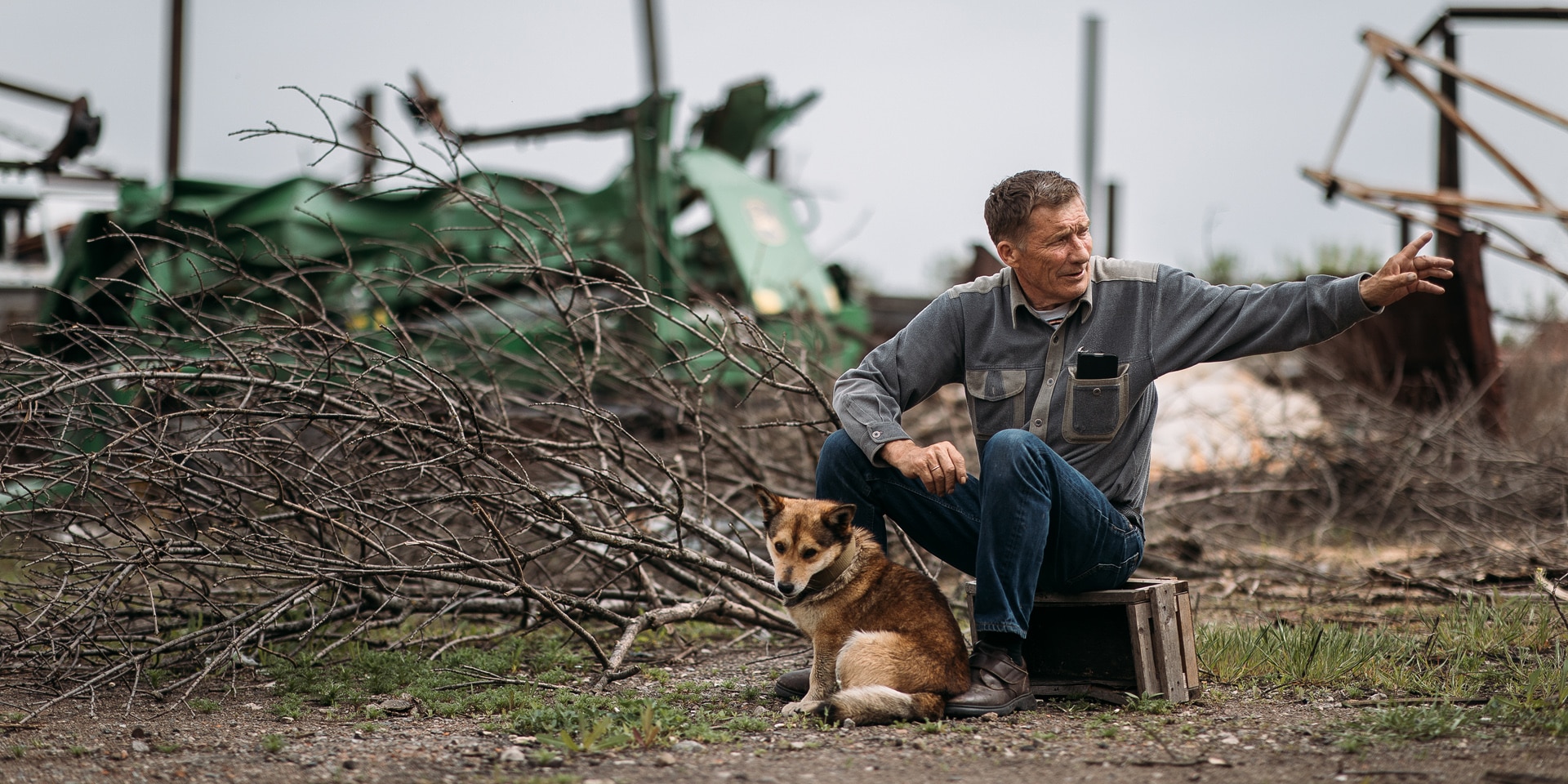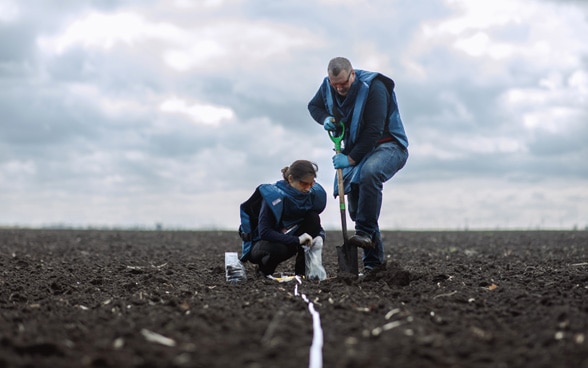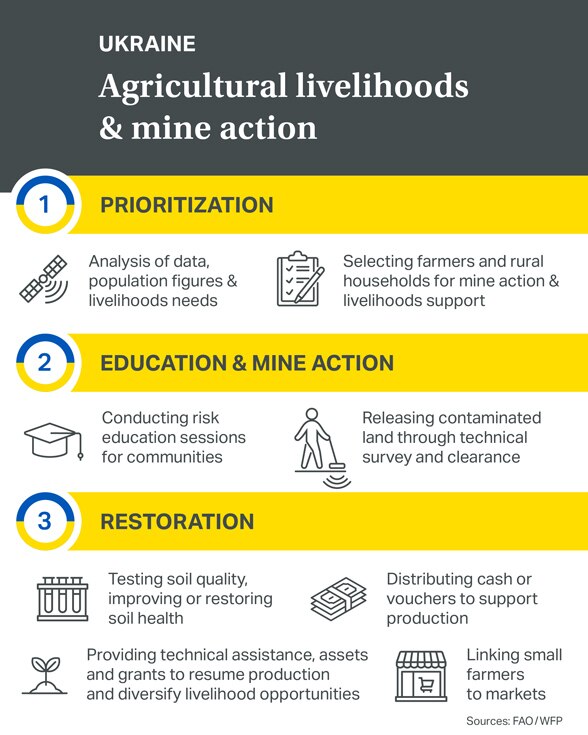Helping farmers get back to their land – one of the challenges of Ukraine's recovery
The threat posed by mines and unexploded ordnance is forcing smallholder farmers and their families to reduce or cease production, thereby compromising the quality, variety and availability of food. This situation undermines the food security of local communities, making them more dependent on humanitarian aid, and is leading some farmers to risk their own lives in order to farm their contaminated land. Switzerland and its partners continue to work to ensure that the affected farmers can get back to work safely and quickly.

A farmer affected by the war waits to be able to farm his land again. © WFP/FAO
Both Andrii Shekera and Serhii Yakovenko have first-hand experience of the contamination of Ukraine's agricultural land. Andrii runs a publicly-funded farm based in the raion (district) of Desna, near Kyiv, while Serhii is the managing director of KVUS-Agro, a 200-hectare private farm in the oblast (province) of Chernihiv in the north of the country. Both have suffered in similar ways as a result of the war that began in Ukraine in February 2022.
The two men work in several locations around the city of Chernihiv. During the active phase of the conflict in the region, in the winter and spring of 2022, both their farms sustained considerable damage and losses. Following repeated strikes and fighting around Chernihiv, Andrii's land was contaminated with unexploded ordnance, mines and other explosive remnants, preventing crops from being sown. One of the buildings was completely destroyed and the remaining greenhouses were damaged by shelling and bombardment. Three tractors also suffered significant damage.
For Serhii, the situation was very similar: the bombardments destroyed much of his equipment, and the Russian occupation of the region led to acts of sabotage and theft. A warehouse containing 4,000 tonnes of grain was ravaged by fire, and two farm workers from Levkovychi lost their lives.
Ukraine Mine Action Conference (UMAC2024)
Switzerland and Ukraine are hosting the Ukraine Mine Action Conference UMAC2024 in Lausanne on 17–18 October 2024, which will bring together high-level representatives from many governments and international organisations, the private sector, civil society and academia. The conference will address the broad aspects of humanitarian mine action under the guiding themes of people, partners and progress. The aim is to highlight the critical importance of mine clearance as a key component of the country's social and economic recovery. Putting the civilian population at the centre of the debate means, among other things, examining the direct and indirect effects of contamination by explosive ordnance on people working in the agricultural sector.
Humanitarian demining is a prerequisite for the country's rapid recovery and reconstruction, and should also enable displaced people to return to their homes and livelihoods. Ukraine intends to take the lead in protecting its population from mines and explosive remnants of war, and in making the land usable again.
Increased accident risk for local residents
More than two years after the start of the conflict, explosive remnants of war continue to pose a threat to local residents, particularly men and women working in agriculture. Andrii and Serhii have tried to find workarounds to keep their businesses afloat, either by continuing to farm land they consider unlikely to have been contaminated or by renting new land elsewhere. However, with the agricultural sector severely impacted and the loss of revenue also having knock-on effects on job opportunities, the options remain limited and the reduced yields are putting local people in a precarious position. In total, 80% of Andrii Shekera's land cannot be farmed due to high levels of contamination. Out of desperation, farmers in the village of Voznesenske (Chernihiv Oblast) have even decided to cultivate potentially contaminated land, despite the risks.
Elsewhere, part of the agricultural workforce has undertaken private mine clearance operations to enable cultivation and sowing. While this assistance has accelerated the clean-up process, some workers have narrowly avoided serious accidents.
In early October 2023, the FSD (Fondation Suisse de Déminage) started clearing mines from some of the fields at Andrii's farm in Chernihiv Oblast. Non-technical surveys of the land were first carried out, before FSD deminers began the clean-up work. But with the business on the verge of bankruptcy, time is running out, and ten farming families are currently at risk of losing their jobs. Meanwhile, the problems at Serhii Yakovenko's farm are putting around 30 families in a situation of food insecurity.

International organisations and mine clearance firms working to assist farmers
Elsewhere in Ukraine, thousands more smallholder farmers have been forced to suspend or scale back production, and almost all are scraping by on declining incomes. Volodymyr Korniicha, whose farm is located in Cherkasy Oblast (around 200 kilometres south-east of Kyiv), was, like many of his neighbours, responsible for part of Ukraine's milk, meat, fruit and vegetable production before the start of the Russian military aggression. Like Andrii Shekera and Serhii Yakovenko, Volodymyr is among the 75% of Ukraine's food-producing workforce now threatened by war and unproductive land.
Since 2022, however, all three farmers have seen a small portion of their land cleared of mines. This progress is the result of a joint project by the World Food Programme (WFP) and the Food and Agriculture Organization of the United Nations (FAO). The FSD's teams are also involved in the process. Focusing mainly on smallholder farmers like Volodymyr Korniicha with less than 300 hectares of land, as well as families who grow crops for their own consumption, the programme is being implemented in the eastern region of Kharkiv. In 2024, it was extended to two more of Ukraine's main agricultural regions, Mykolaiv and Kherson.

This programme aims to ensure food security for small local communities, which are also the hardest hit by contamination from mines and unexploded ordnance. Many rural families rely on produce from their own gardens to meet their daily nutritional needs and diversify their diets. If they are unable to grow crops, these families will eventually become more dependent on humanitarian aid. The aim of the programme is to reduce this dependence and help them become more self-sufficient. It also contributes to the restoration and sustainability of Ukraine's food systems by enhancing the local and national economies and improving trade. With some homes still without heating, electricity and gas, the FAO also assesses the specific needs of households and offers financial assistance to those left destitute as a result of the war.
